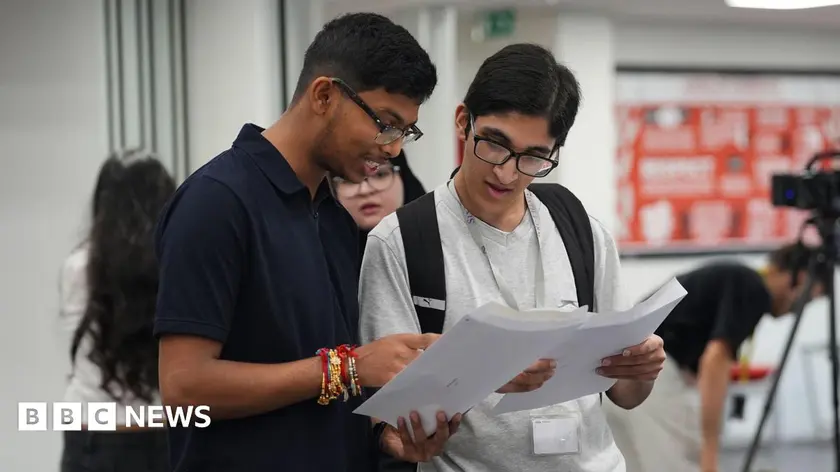T4K3.news
Top grades rise again on A level T level and BTEC results day
Record top grades and more 18-year-olds entering first-choice universities, with ongoing concerns about regional inequalities and pandemic-era impacts.

Admissions experts say a record number of 18-year-olds could get into their first choice of university.
Top grades rise again on A level T level and BTEC results day
A level, T level and BTEC results across England, Wales and Northern Ireland show top grades rising. 28.3% of all grades were A* or A, up from 27.8% last year. A record number of 18-year-olds secured places at their first-choice universities. The data also reveals a widening gap between London and the North East, with the capital performing best and the North East lowest. Education Secretary Bridget Phillipson calls the gaps a national outrage and says there are entrenched inequalities that continue to blight life chances for many young people, especially those from white working-class backgrounds. For the first time in seven years, boys outperformed girls in the top A-level grades across the three nations.
Olivia Melville, a student at Telford College, earned a health T-level distinction and hopes to enter university via clearing to study midwifery. She says the T-level route appealed because it offers hands-on work placements and was exciting as one of the first cohorts.
Dr Saxton noted that Year 13 students will need universities to respect and understand the particular circumstances they faced during national lockdowns in 2020 and 2021. Those years saw spikes in pass rates at GCSE and top A-level grades due to teacher assessments, followed by a gradual return to pre-pandemic standards. England completed that normalization in 2023, while Wales and Northern Ireland did so last year. GCSE passes fell in 2023 in England as grading returned to pre-pandemic norms.
Key Takeaways
"There were entrenched inequalities that continue to blight the life chances of too many young people."
Education Secretary Bridget Phillipson on inequality
"I chose a T-level because I wanted hands-on work experience."
Olivia Melville, T level student
"Year 13 students would need universities to respect and understand the circumstances they have faced."
Dr Saxton on pandemic-era learning
The rise in top grades looks like progress, but it is layered with unequal outcomes. The widening regional gap raises questions about resource allocation, school funding, and local opportunities. Policy makers face pressure to translate better short-term results into long-term social mobility, especially for students from disadvantaged backgrounds. The shift toward vocational routes like T-levels suggests a diversification of paths into higher education and the workforce, but it also challenges traditional university admission norms. The episode underscores how the pandemic still casts a shadow on learning experiences and the need for a fair assessment system that recognizes different student journeys.
Highlights
- The numbers gloss over a stubborn map of inequality.
- Hands-on routes matter when they open doors that exams cannot.
- Respect the circumstances these students have faced.
- Rising grades look bright but the gaps stay real.
Political and public reaction risk around inequality and funding
The story centers on inequality, government response, and regional disparities, which can trigger political backlash and budget debates. Policymakers and schools may face scrutiny over funding, admissions practices, and how well outcomes translate to real opportunity.
Policy choices will determine whether rising grades translate into real opportunity.
Enjoyed this? Let your friends know!
Related News

A level results show regional gaps persist

Bengals rookies impress during training camp

UK A level results show private schools losing ground to state rivals

Coaching tiers shape 2025 season

Results day guidance from Clarkson

A level results drive record numbers into first choice universities

Eagles win previews depth

Record A level top grades in England
